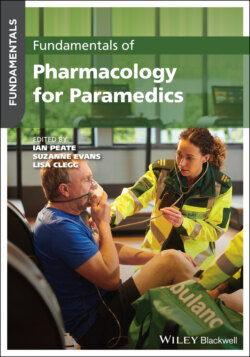Читать книгу Fundamentals of Pharmacology for Paramedics - Группа авторов - Страница 53
Joint Royal Colleges Ambulance Liaison Committee (JRCALC) Clinical Practice Guidelines
ОглавлениеThe JRCALC Clinical Practice Guidelines are an essential resource for paramedics and other healthcare professionals, in emergency care, on the road and in the community. The JRCALC books and app combine expert advice with practical guidance to ensure uniformity in the delivery of high‐quality patient care. The books, available as either the comprehensive reference edition or the pocket guide, cover a wide range of topics, from resuscitation, medical emergencies, trauma, obstetrics and medicines to major incidents and staff wellbeing. They include an extensive UK drugs formulary and Page for Age drugs tables to assist in making medicines administration simple. To date, the hard‐copy publication has been revised every 2–3 years. The digital version, via an app, is also available for prehospital clinicians to download. The electronic app version is updated more regularly.
The JRCALC Guidelines make reference to the National Institute for Health and Care Excellence (NICE) where appropriate. NICE guidelines inform the breadth of the National Health Service (NHS) in England and are also subject to regular review, update or withdrawal. Independent providers and ambulance services outside the UK should refer to their equivalent guidelines and institutions informing these.
Paramedics must be aware that any subsequent changes in evidence‐based guidance after the date of any publication will not be incorporated within the published document. This emphasises the need for vigilance and awareness of possible emergent variations or changes in clinical practice and continuous professional development, as reflected within the HCPC paramedic standards of proficiency. This also supports the increasing use by paramedics of the more regularly updated digital format of the JRCALC Guidelines.
It is worth noting that the physical, hard‐copy JRCALC Guidelines text books are available through bookshops and are on sale separately from the digital app. The app is available to the public via the internet on a subscription basis. Ambulance trusts in the UK can also develop a ‘service‐specific’ version of the JRCALC app. This is referred to as the ‘JRCALC plus’, with most ambulance trust in the UK opting to use this resource for their employees rather than issuing hard‐copy books. Independent providers and ambulance services outside the UK who are interested in the ‘JRCALC plus’ option should contact the publisher direct. This JRCALC (app) resource offers the most current guidance as the digital format can be more easily updated.
Most of the content of the JRCALC Guidelines is universally applicable to NHS ambulance services. However, some modification of these may be evident in regional/individual ambulance services and independent and non‐UK ambulance service providers as approved by relevant clinical committees or equivalents to best meet the needs of local service users. Another area of modification to the JRCALC Guidelines for paramedics to be aware of may arise through research sanctioned by relevant research ethics committees.
